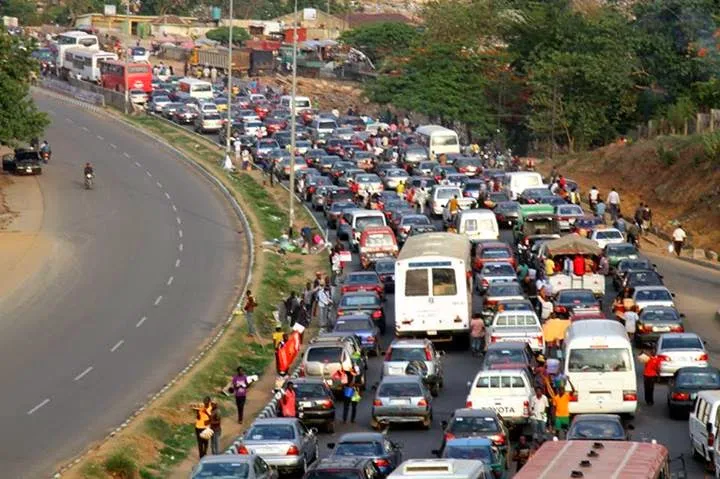The Federal Capital Territory (FCT), Abuja is one of the leading states in Nigeria with the best road network. The roads are not just parlous but well-lit with street lights, and greenery with a beautiful range of mountain landscapes that allure visitors and residents as they commute daily.
Abuja being first, the administrative epicentre of Nigeria’s government has mostly civil servants who cannot afford the high cost of rents in the city living in the satellite towns and suburbs and making the daily commute into the city, as well as businessmen and women whose businesses are clustered within the city.
Abuja has three major roads leading into the city; Abuja-Keffi (Nyanya-Maraba road); Airport/Lugbe Road and the Kubwa expressway. These three major access road corridors are laden with massive congestion and traffic gridlock during the morning peak period when commuters are going to work, places of business and, in the evenings when commuters are returning from work.
The dearth of an efficient public transport system has a negative effect on commuters’ experience. For example, commuters who flow into the city during the day for economic and commercial activities are exposed to serious air pollutants, especially particulate matter from the exhaust of automobiles.
- Court upholds Ayu’s removal as PDP national chairman
- Meet Nigerian entertainers who recently received national honours
Report has it that an average Abuja commuter from the suburbs spends about 26 days in a year in traffic while about 2 million deaths are attributed to air pollution from road traffic. The unpredictability in estimated travel time and/or wait time at both designated and undesignated points also has an impact on commuters’ productivity and efficiency.
Very recently, commuters’ experience has worsened due to the adjustment in premium motor spirit (PMS) prices where private commercial public transport operators peg their charges at will with no regulation.
These drivers do not only demand outrageous amounts from passengers but further subject their comfort to ridicule by carrying more than the approved passengers. Passengers who dare to object are requested to drop thereby extending their wait time or endure being sandwiched against each other.
Interactions with commuters in Abuja have revealed that the majority of them resume at their offices tired and fatigued, with little or no enthusiasm to undertake tasks for the new day. Others complain on the impact the recent change has had on their mental health; some complain they no longer look forward to leaving their houses.
The transport sector drives the economy of any country and an efficient public transport system has far-reaching gains and shouldn’t be ignored.
Unfortunately, Abuja does not have an efficient public transport system as such; there is high automobile dependency which is worrisome. The majority of the population depend on automobiles to move around and this comes with a box load of challenges.
The long wait on the roads by passengers exposes them to exhaust emissions that are detrimental to their health just as the indiscriminate picking and dropping off of passengers due to lack of bus stops disrupts the orderliness and traffic flow on our roads, aggravating the already existing problem of congestion.
Touts who are popularly known as Agberos are now marshalling popular car stops in the city contributing to traffic overflow as they most times struggle to extort money from drivers or make trouble with them.
Abuja only has few designated bus stops within the city, with no firm rules and regulations guiding their use because of these passengers and drivers are emboldened to wait and or pick up passengers indiscriminately.
A great way to start fixing this issue is to overturn the automobile-dependent nature of the city, exploring other viable options such as walking, cycling, bus rapid transit system (BRT) etc. The more options we encourage, the more diversified and efficient our transportation system becomes.
Latin American cities for instance, the BRT System has proven to be an effective transportation system. Interestingly, this system has been adopted in Lagos, although not optimally efficient but commuters on the BRT buses are guaranteed a designated lane, designated bus stops, and a fairly predictable travel time.
With Abuja rapidly urbanizing; there’s something to learn from Lagos, which is to avoid the traffic situation they are currently experiencing but more importantly, to adopt the BRT model to optimize commuters’ travel experience.
The city‘s administrators can adopt the BRT system to reduce vehicular traffic and waste of productive man hours in traffic. An effective public mass transport system will discourage private individuals from moving everywhere with their private vehicles which contributes to greenhouse gas emissions that are largely responsible for climate change.
Clean air in cities is desirable and all of this can be achieved with the right systems in place. The goal is to ensure that fewer vehicles are on the road and traffic congestions are reduced or eliminated and only then can the true vision of Abuja being a 15-minutes city be achieved.
Bassey is a sustainable urban enthusiast and Executive Director at HipCity Innovation Centre. He can be reached via [email protected] Bassey

 Join Daily Trust WhatsApp Community For Quick Access To News and Happenings Around You.
Join Daily Trust WhatsApp Community For Quick Access To News and Happenings Around You.


